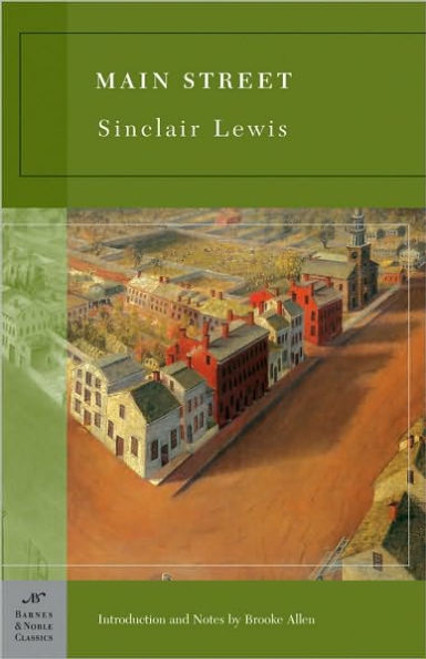In Main Street and Babbitt, Sinclair Lewis drew on his boyhood memories of Sauk Centre, Minnesota, to reveal as no writer had done before the complacency and conformity of middle-class life in America. These remarkable novels combine brilliant satire with a lingering affection for the men and women who, as Lewis wrote of Babbitt, want "to seize something more than motor cars and a house before it's too late."
Main Street (1920), Lewis's first triumph, was a phenomenal event in American publishing and cultural history. Lewis's idealistic, imaginative heroine, Carol Kennicott, longs "to get [her] hands on one of these prairie towns and make it beautiful," but when her doctor husband brings her to Gopher Prairie, she finds that the romance of the American frontier has dwindled to the drab reality of the American Middle West. Carol first struggles against and then flees the social tyrannies and cultural emptiness of Gopher Prairie, only to submit at last to the conventions of village life. The great romantic satire of its decade, Main Street is a wry, sad, funny account of a woman who attempts to challenge the hypocrisy and narrow-mindedness of her community.
"I know of no American novel that more accurately presents the real America," wrote H. L. Mencken when Babbitt appeared in 1922. "As an old professor of Babbittry I welcome him as an almost perfect specimen. Every American city swarms with his brothers. He is America incarnate, exuberant and exquisite."
In the character of George F. Babbitt, the boisterous, vulgar, worried, gadget-loving real estate man from Zenith, Lewis fashioned a new and enduring figure in American literature - the total conformist. Babbitt is a "joiner," who thinks and feels with the crowd. Lewis surrounds him with a gallery of familiar American types - small businessmen, Rotarians, Elks, boosters, supporters of evangelical Christianity. In bitingly satirical scenes of club lunches, after-dinner speeches, trade association conventions, fishing trips, and Sunday School committees, Lewis reproduces the noisy restlessness of American commercial culture.
In 1930 Sinclair Lewis was the first American to be awarded the Nobel Prize for literature, largely for his achievement in Babbitt. These early novels not only define a crucial period in American history - from America's "coming of age" just before World War I to the dizzying boom of the twenties - they also continue to astonish us with essential truths about the country we live in today.
About the Author
Sinclair Lewis was born in 1885 in Sauk Centre, Minnesota, and graduated from Yale University in 1908. His college career was interrupted by various part-time occupations, including a period working at the Helicon Home Colony, Upton Sinclair’s socialist experiment in New Jersey. He worked for some years as a free lance editor and journalist, during which time he published several minor novels. But with the publication of Main Street (1920), which sold half a million copies, he achieved wide recognition. This was followed by the two novels considered by many to be his finest, Babbitt (1922) and Arrowsmith (1925), which was awarded the Pulitzer Prize in 1926, but declined by Lewis. In 1930, following Elmer Gantry (1927) and Dodsworth (1929), Sinclair Lewis became the first American author to be awarded the Nobel Prize for distinction in world literature. This was the apogee of his literary career, and in the period from Ann Vickers (1933) to the posthumously published World So Wide (1951) Lewis wrote ten novels that reveal the progressive decline of his creative powers. From Main Street to Stockholm, a collection of his letters, was published in 1952, and The Man from Main Street, a collection of essays, in 1953. During his last years Sinclair Lewis wandered extensively in Europe, and after his death in Rome in 1951 his ashes were returned to his birthplace.
About the Editor
John Hersey (1914-1993), editor, published fifteen books of fiction and nine of reportage and essays, and was awarded the Pulitzer Prize for Fiction. In 1937 he served as Sinclair Lewis's secretary.
The Library of America is an award-winning, nonprofit program dedicated to publishing America's best and most significant writing in handsome, enduring volumes, featuring authoritative texts.







